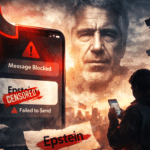As tensions escalate between Iran and Israel, the decision-making apparatus surrounding former President Donald Trump is coming under increased scrutiny. Reports indicate that Trump, once again at the political forefront, is leaning heavily on a small, tight-knit circle of advisors as he contemplates potential U.S. military action against Iran. This group includes prominent hawkish figures such as Gen. Erik Kurilla, Sen. Marco Rubio, and Gen. Dan Caine, while more restrained voices, such as Tulsi Gabbard and Pete Hegseth, have been notably sidelined. This narrowing of counsel, echoing past presidential behaviors, sets the stage for a dangerous dynamic known in political psychology as “groupthink,” raising historical and strategic alarm bells.
Groupthink: When Consensus Becomes a Liability
Groupthink, a term coined by psychologist Irving Janis, refers to a phenomenon in which the desire for unanimity within a decision-making group overrides the motivation to appraise alternative courses of action realistically. When a leader surrounds themselves with likeminded advisors and suppresses dissenting opinions, the risk of flawed judgments and strategic errors increases dramatically. The desire to preserve cohesion and maintain a facade of consensus can silence alternative perspectives, discourage debate, and foster dangerous overconfidence in high-stakes environments like wartime planning.
A Cautionary Tale: Bush and the 2003 Iraq Invasion
The 2003 U.S. invasion of Iraq stands as a stark reminder of how groupthink can derail national strategy. Despite warnings and internal doubts, the Bush administration forged ahead based on the false premise that Saddam Hussein possessed weapons of mass destruction. Critical dissent, particularly within intelligence agencies, was downplayed or ignored. The Senate Intelligence Committee later confirmed that many of the key assessments were either exaggerated or unsupported by reliable evidence. Decision-making became increasingly insular, with key dissenters marginalized, and the catastrophic outcomes—strategic failure, regional instability, and a fractured global reputation—highlight the dangers of consensus-driven blindness.
Netanyahu’s Long Game: Shaping the Narrative on Iran
Today, the specter of Iran’s nuclear capability continues to dominate Israeli and American political discourse. Since the 1990s, Israeli Prime Minister Benjamin Netanyahu has consistently warned that Iran is mere moments away from obtaining a nuclear weapon. Despite nearly three decades of these warnings, no verified nuclear weapon has materialized. Still, the narrative persists and has deeply influenced U.S. foreign policy, especially under administrations predisposed toward hardline stances. Netanyahu’s rhetoric creates a strategic pressure cooker that limits the range of acceptable policy responses and primes American leadership to view military intervention as a logical, if not inevitable, step.
Trump’s Advisory Echo Chamber: Repeating the Pattern
The parallels between Bush’s 2003 decision-making and Trump’s current posture are hard to ignore. In both cases, a homogenous group of advisors encouraged a singular interpretation of the threat landscape, suppressing alternative strategies and reinforcing the urgency of military solutions. Trump’s current advisory circle seems primed to repeat this pattern. With voices advocating restraint excluded from meaningful deliberation, the risk of a preemptive and potentially catastrophic miscalculation grows. This groupthink environment not only stifles debate but also fosters a false sense of strategic clarity, which history has shown to be dangerously misleading.
Risks of Unchecked Consensus
The implications are severe. Should the United States launch or support military strikes based on incomplete or narrowly interpreted intelligence, the fallout could destabilize the entire Middle East. Diplomatic off-ramps, such as those being quietly explored behind the scenes according to The Times, could be overshadowed by the momentum of militarized consensus. Internal echo chambers, emboldened by ideological unity and reinforced by long-standing narratives, risk steamrolling over the complex realities of the region.
Final Note: Lessons Ignored are Lessons Repeated
Understanding the psychological underpinnings of decision-making at the highest levels is essential for anticipating potential policy missteps. Groupthink is not merely a theoretical concept—it has shaped wars, toppled governments, and left deep scars on international order. Today, as the world watches Trump weigh options against Iran, remembering the lessons of 2003 is not only wise but urgent.
In a time of heightened stakes and rapidly evolving conflict, the need for diverse viewpoints, rigorous debate, and skepticism of long-held assumptions is more vital than ever. The failure to heed these lessons risks not only repeating past mistakes but doing so under the illusion of unified certainty. America must choose whether to learn from history—or relive it.















